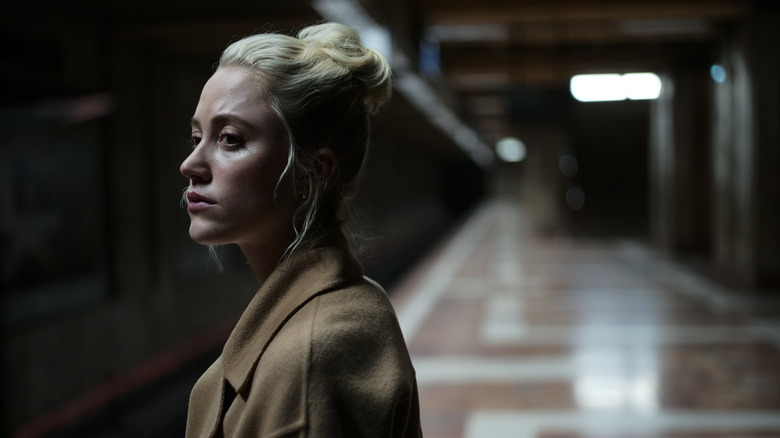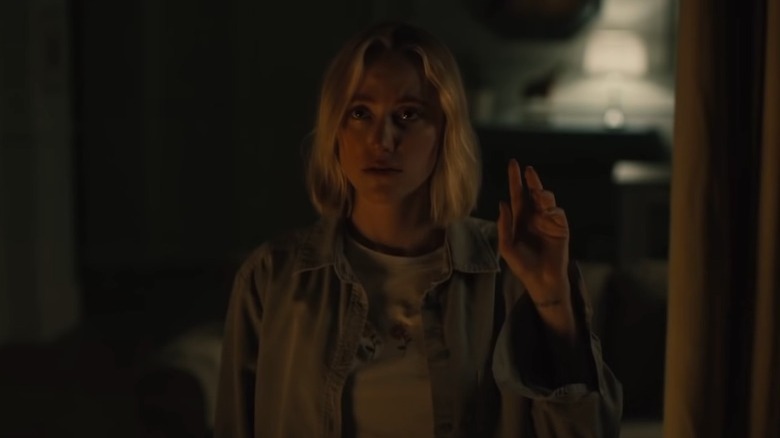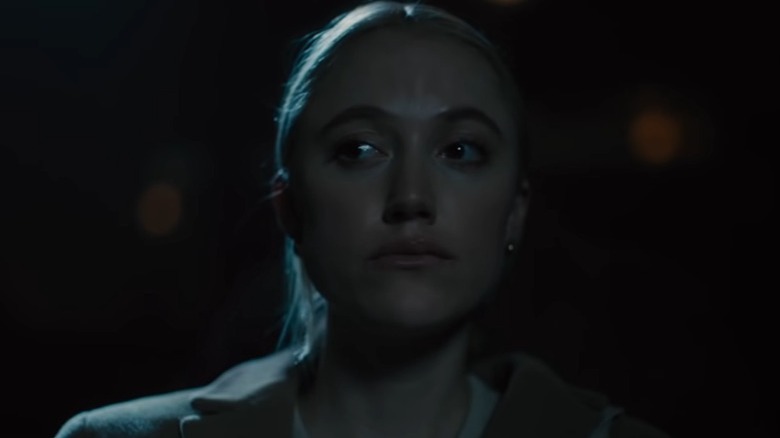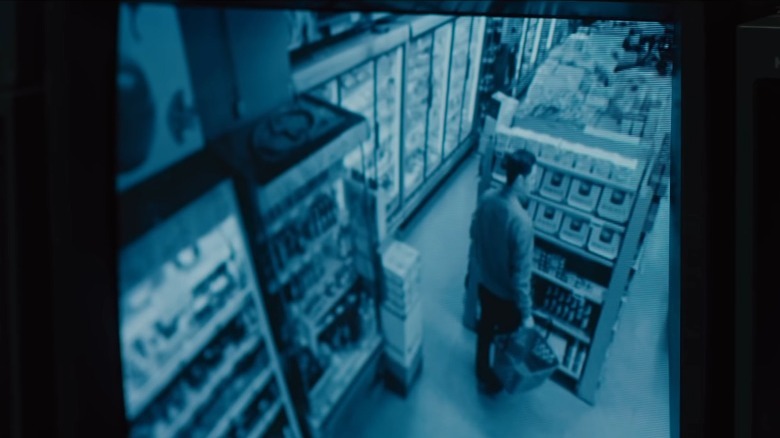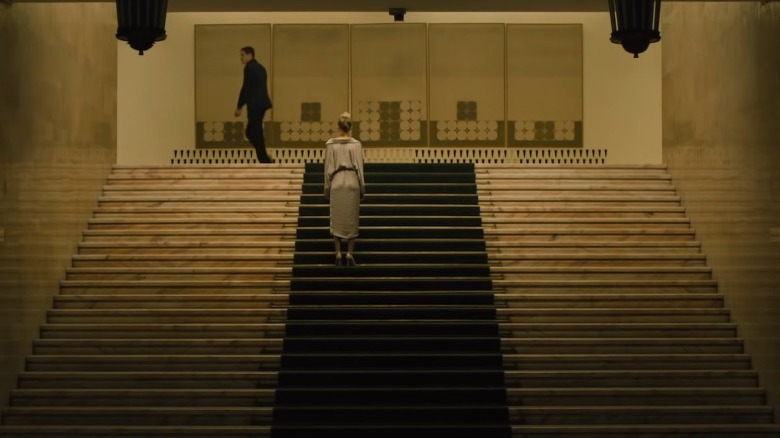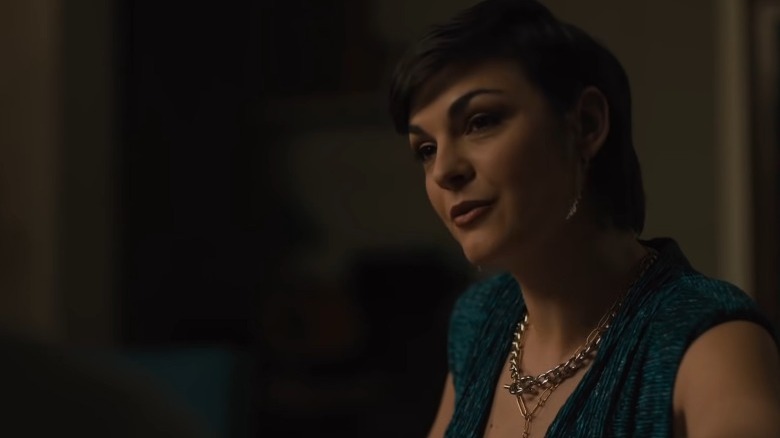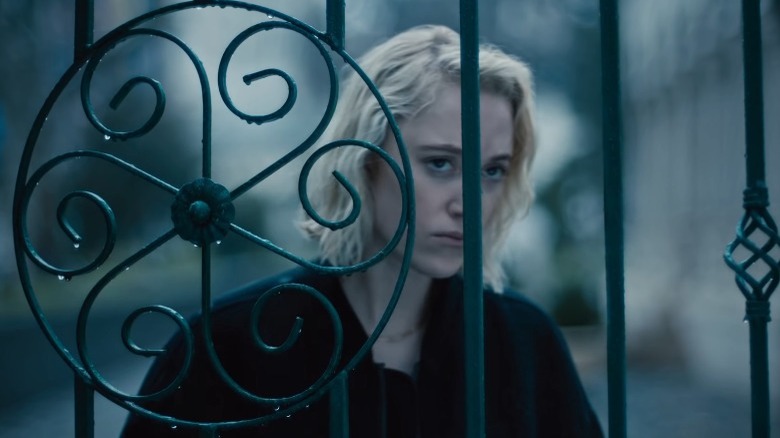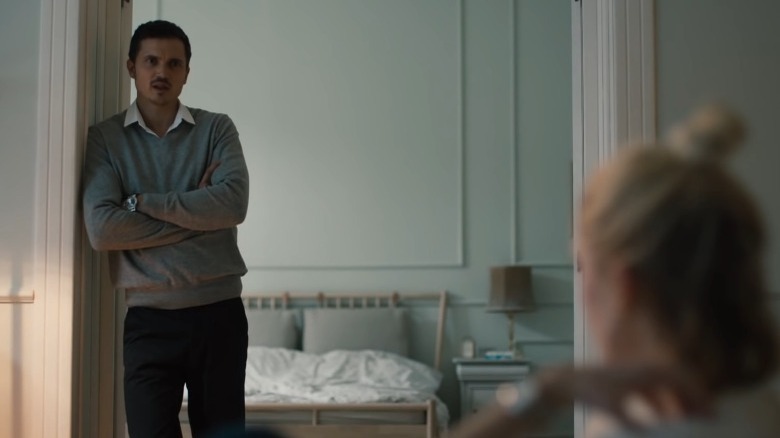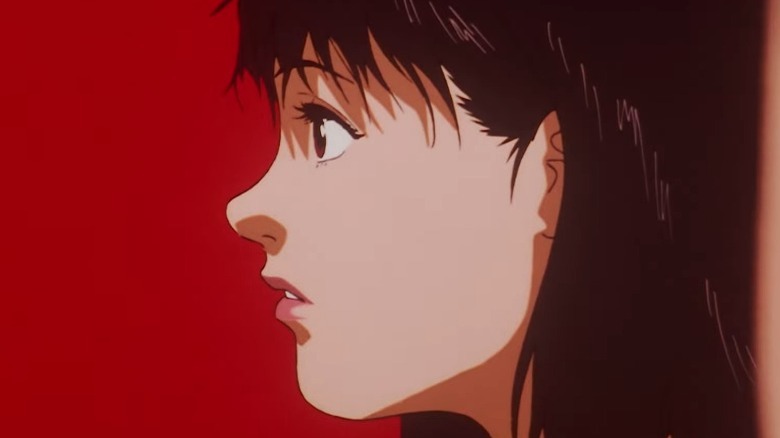The Ending Of Watcher Explained
A couple living in a new country, a gruesome serial killer, and a shadowy stalker are the subjects of "Watcher," a paranoid thriller from 2022. Written and directed by Chloe Okuno, the movie expertly ramps up the tension while also keeping the audience guessing until its final few minutes. "Watcher" is deeply disturbing, and it's also a quick watch, which makes it one of the best horror movies streaming right now.
Maika Monroe, who fans might recognize from "It Follows," plays Julia in the film. She moves with her husband Francis to Bucharest to help support his new promotion at a marketing company. She doesn't know the language, but she plans on making the best of the situation. That's when she notices that her neighbor across the street keeps staring at her from his apartment. Julia starts to believe that she's being followed everywhere she goes, and she thinks her stalker might be connected to a serial killer called the Spider.
"Watcher" isn't exactly a mystery movie, but the story isn't completely cut and dry either. There's more than enough paranoia, mistaken identities, and false leads to go around. Don't worry if you walked away from the film's explosive ending still trying to put the pieces together: We've got the whole puzzle assembled already.
What you need to remember about the plot of Watcher
"The Watcher" follows Julia (Maika Monroe) as she moves to Bucharest after her husband Francis (Karl Gusman) gets a promotion at work. The movie begins with the happy couple arriving in the city and going to see their new apartment. Right in the heart of the city, the apartment is nice, but Julia notices a problem with it right away. An entire wall of windows faces another apartment complex across the street, and before too long a mysterious figure in the other building is watching Julia on a daily basis.
The more that Julia becomes concerned with the man watching her from the other building, the more she starts to feel paranoid everywhere she goes. What makes matters even worse is that Julia's paranoia might actually be based in reality. One day she goes to a nearly empty movie theater, and shortly after the movie begins, a man sits directly behind her. Julia gets up to leave, only to notice the man following her out a few minutes later.
Julia tries to express her anxiety to Francis, but he doesn't take her concerns all that seriously. Eventually, after some intense prodding from Julia, Francis helps her make a complaint about their neighbor Danieto the police. That's when things go from bad to worse. A couple of days later, the police officer shows up at Julia's apartment. Her neighbor, a man named Mr. Weber (Burn Gorman), has come along because he's filing a complaint accusing Julia of following him around.
What happened at the end of Watcher
Once the police get involved, Francis loses all faith in his wife. He refuses to take Julia's concerns seriously, and the two of them start to grow apart. The only person that Julia can confide in is her next-door neighbor, Irina. The two of them become friends, until Irina suddenly goes missing. Julia becomes deeply concerned that Irina's disappearance is tied to her stalker, or worse, to a serial killer operating in Bucharest who authorities have nicknamed the Spider.
One night while at a work party with Francis, Julia overhears him making fun of her concerns with his coworkers. Francis doesn't realize that Julia has been learning Romanian to fit into their new home. The two of them get into a fight, and Julia storms off, planning to take her things and leave the city. On her way back to the apartment, she encounters Mr. Weber on the subway. He tells her that he started watching her because he's lonely and caring for his sick father, but he never meant things to get so out of hand.
While packing her bags at home, Julia hears music coming from Irina's apartment. She walks in to find Irina's headless corpse, and swiftly gets attacked by Mr. Weber. As Julia bleeds out on Irina's floor, Mr. Weber cleans up and gets ready to leave. Out in the hall, he crosses paths with Francis, and the two of them stare at each other for a moment before Julia shoots and kills Mr. Weber with a gun she knew was hidden in Irina's coffee table.
What did the Watcher's police report mean?
"Watcher" could have easily been a crime story or a whodunnit surrounding mysterious killings taking place in Bucharest and one young woman's unfortunate interactions with the killer. Instead, the movie almost exclusively focuses on Julia's perspective. It delves into her discomfort in the city, and her rising paranoia which just so happens to be completely justified.
The movie's single-minded focus on its main character is a big reason why "Watcher" is such an intense film. It's impossible not to be entirely taken in by Julia's feelings, especially with Maika Monroe's expert performance. What the story loses, however, is real insight into Mr. Weber's motivations and methodology. Because of that, his decision to report Julia to the police is utterly baffling at first glance.
Mr. Weber has plenty to lose by bringing more attention to himself. It wouldn't take too long for an observant officer to notice that the killings in the city all happen fairly close to a man who's been reported for stalking. He has to know the risks, so why does he make the report? If this were a crime film, Mr. Weber's report would help throw off the investigation, deflecting suspicion away from himself by making him look like the real victim. In the context of "Watcher," though, the report just notches up the tension of Mr. Weber's psychological torture of Julia. It makes her feel even more paranoid and desperate than she did before. It's all part of the sick game that Mr. Weber is playing with her.
What was the importance of that fateful train ride?
Despite being the shadowy driving force of the entire plot, Burn Gorman's Mr. Weber doesn't get very much screen time in "Watcher." We probably see his silhouette just about as much as his actual face throughout the movie. The absence of his physical presence makes his one big scene in the movie all the more compelling — and so much creepier.
"Watcher" really pulls off telling two stories at once. On one hand, it's a story about a serial killer stalking a foreign woman, messing with her mind before finally making his move to kill her. On the other hand, it's a story about one woman's descent into utter paranoia and madness as she fails to adjust to living in a new environment. Julia's confrontation with Mr. Weber on the train helps ramp up the intrigue surrounding that first plot, but it acts as the climax for the parallel story being told in the movie.
Julia reaches peak paranoia as Mr. Weber explains himself to her on the train. She has no real reason to suspect that Mr. Weber is the Spider. He went to the police himself, and now he's explaining that he's just a lonely man who got a little too interested in his neighbor. Instead of relaxing, Julia can't help but fixate on the plastic bag next to Mr. Weber. She's convinced that it's carrying the head of one of the Spider's victims, and she all but runs off the train the first chance she gets. Julia's totally broken in that moment, but Mr. Weber has yet to begin his real attack.
What did Irina's role in the story mean?
Julia's neighbor Irina doesn't have all that much impact on the movie's plot. As the two of them become friends, Irina tells Julia about the gun that she has hidden in her apartment for protection. Later, Irina's friend Cristian comes looking for her, and he meets Julia. At her request, Cristian goes to Mr. Weber's apartment and tells him to leave Julia alone, threatening him in Romanian for good measure. The next time we see or hear anything from Irina, it's after Mr. Weber has already killed her.
Though she doesn't necessarily change the course of the story, Irina still has an important part to play in "Watcher." She becomes Julia's only friend in Bucharest, and by watching the two of them get along, the audience gets a better idea of how far Julia's paranoia tears her down. Irina is the only person who really believes Julia when she says that she's in danger, and it's Irina's belief that gives Julia the confidence not to second guess herself when Francis refuses to take her seriously.
Without Irina, Julia would have gone to pieces much more quickly. Not to mention the fact that she wouldn't have known about the gun which ultimately puts an end to Mr. Weber's murder spree. Irina's presence ends up stopping the serial killings plaguing Bucharest. That is, assuming that Mr. Weber was actually the killer the police called the Spider.
The Spider's real identity could change the movie's ending
Not long after arriving in Bucharest, Julia learns that a serial killer is being hunted by the city's police. Nicknamed the Spider, the killer is known for attacking young women and decapitating them. The more she feels like she's being watched, the more Julia comes to believe that her neighbor Mr. Weber is the Spider. Her fear reaches its peak when she's sitting on the train with Mr. Weber, and he's holding a plastic bag that definitely looks like it could contain a head.
By the end of the movie, it seems like Julia was right all along. She finds Irina decapitated in her apartment, and there's Mr. Weber, finally ready to kill Julia as well. That said, there's also some evidence in the movie that Mr. Weber might just be a copycat, and the real Spider could be someone else entirely.
Earlier in the film, the police announce that they've caught the Spider. Francis uses that fact as a reason to stop believing Julia's fears, and with the killer off the streets, even the police don't seem all that concerned that Julia thinks she's being stalked. Also, in Julia's final confrontation with Mr. Weber, he stabs her, which entirely goes against the Spider's MO. It's entirely possible that Mr. Weber was just a lonely man who became as obsessed with the Spider as Julia did — except instead of being afraid, Mr. Weber decided to become a copycat killer.
What does this all mean for Julia and Francis's future?
Julia and her husband seem to have a healthy relationship at the beginning of the movie, but it quickly deteriorates after they arrive in Bucharest. They aren't in the city all that long before it becomes clear that Julia is miserable. She doesn't know anyone in her new neighborhood, and she can't speak the language. She's terrified that she's being stalked by a killer, and that fear consumes her every waking moment.
For Francis's part, he doesn't seem to be all that great of a husband. He's constantly away from home working long hours. He doesn't do anything to help Julia get adjusted to their new country, and when she starts getting worried about her stalker, it doesn't take long for him to disregard her concerns entirely. Eventually, he goes as far as making her the butt of jokes at work to try and get closer to his bosses.
It'd be easier for Julia and Francis to get things back on track if their biggest problem had been Julia's stalker. At the end of the movie, Francis witnesses Mr. Weber leave Irina's apartment, and then sees Julia shoot him in the hall. He knows that she was right all along now, and maybe the trauma of that evening brings them back together for a time. Setting aside stalkers and serial killers, the two of them still have some serious trust issues in their relationship, and it's hard to imagine that will all go away just because of one dramatic night.
What director Chloe Okuno has to say about the film's perspective
The screenplay for "Watcher" was originally written by Zack Ford, and after writer-director Chloe Okuno took over, some things changed. One of the most dramatic differences between the two versions of the script is the setting. Ford's story originally took place in New York City, but when the production moved to Bucharest, Julia's feelings of loneliness and alienation throughout the story got turned up several notches.
The other big change to the script came from Okuno herself. "When I came onboard and took over some of the writing, I wanted to make sure that the character of Julia, in particular, reflected my experience of being a woman in the world," she told A.frame. Okuno's movie forces audiences into Julia's perspective and fragile state of mind. She knows that she's being stalked, but she also knows that the people around her aren't likely to take her concerns seriously. She's constantly having to minimize her concerns and fears for the sake of everyone else in her life.
The tension is the crux of the entire movie. "It's this frustrating, vicious circle in which your emotion becomes more and more heightened, and yet, you know that you can't let anyone see it," Okuno said. As the movie goes on, audiences don't just get more scared for Julia's life: They get more angry, furious at the people surrounding Julia in Bucharest who refuse to take her worries seriously.
How the director's influences impact Watcher's meaning
Sometimes the movies that a director watches while working on a new project end up being incredibly impactful. Influences affect everything from storytelling to tone setting, and understanding what inspired a director working on a particular movie can help you understand that film on a much deeper level.
In an interview with ScreenRant, Chloe Okuno talks about the films that most heavily influenced her while working on "Watcher." Interestingly, she'd just shot a short horror piece for "V/H/S/94," and that helped get her ready for the scarier moments of "Watcher." She said "Seven" was a big inspiration for her, and there are definitely some similarities between Mr. Weber and John Doe. Okuno also cited "Lost in Translation" as an influence, and it's easy to see where "Watcher" borrows from that movie in expressing Julia's loneliness in a foreign country.
Another more surprising influence that Okuno mentioned is the 1997 Japanese animated film "Perfect Blue." That movie centers on a pop star named Mima who transitions into acting, only to be stalked by her manager Rumi who's developed a second personality that believes she's the real Mima. The obsessiveness and stalking themes from that movie clearly translate into "Watcher," but the idea that Rumi wanted to assume another identity might also lend some credibility to the theory that Mr. Weber became so obsessed with the Spider he decided to imitate the serial killer's crimes.
